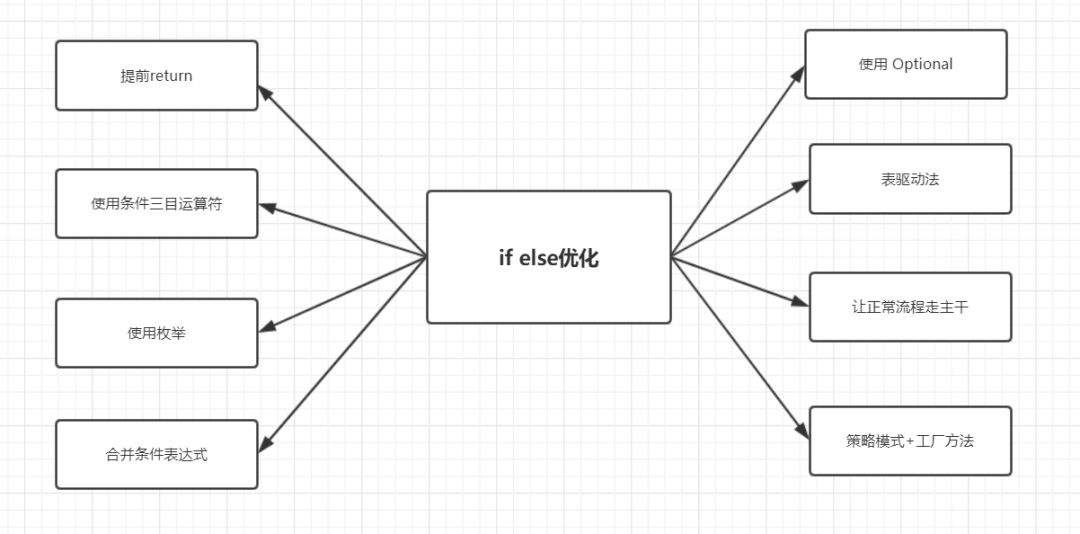If there are more if else in the code, it's difficult to read, maintain and generate bugs. Next, this article will introduce eight schemes to optimize if else code.

Optimization scheme 1: return in advance to remove unnecessary else
If the if else code block contains a return statement, you can consider using return ahead of time to kill the extra else and make the code more elegant.
Before optimization:
if(condition){
//doSomething
}else{
return ;
}
After optimization:
if(!condition){
return ;
}
//doSomething
Optimization scheme 2: use conditional binomial operator
Some if else operators can be simplified by using conditional binomial operators, which makes the code more concise and readable.
Before optimization:
int price ;
if(condition){
price = 80;
}else{
price = 100;
}
After optimization:
int price = condition?80:100;
Optimization scheme 3: use enumeration
In some cases, enumeration can also be used to optimize if else logical branches, which can also be seen as a table driven method according to personal understanding.
Before optimization:
String OrderStatusDes;
if(orderStatus==0){
OrderStatusDes ="Order not paid";
}else if(OrderStatus==1){
OrderStatusDes ="Order paid";
}else if(OrderStatus==2){
OrderStatusDes ="Shipped";
}
...
After optimization: (define an enumeration first)
public enum OrderStatusEnum {
UN_PAID(0,"Order not paid"),PAIDED(1,"Order paid"),SENDED(2,"Shipped"),;
private int index;
private String desc;
public int getIndex() {
return index;
}
public String getDesc() {
return desc;
}
OrderStatusEnum(int index, String desc){
this.index = index;
this.desc =desc;
}
OrderStatusEnum of(int orderStatus) {
for (OrderStatusEnum temp : OrderStatusEnum.values()) {
if (temp.getIndex() == orderStatus) {
return temp;
}
}
return null;
}
}
With enumeration, the above if else logic branch can be optimized to one line of code:
String OrderStatusDes = OrderStatusEnum.0f(orderStatus).getDesc();
Optimization scheme 4: merge condition expression
If a series of conditions return the same result, you can combine them into a conditional expression to make the logic clearer.
Before optimization:
double getVipDiscount() {
if(age<18){
return 0.8;
}
if("Shenzhen".equals(city)){
return 0.8;
}
if(isStudent){
return 0.8;
}
//do somethig
}
After optimization:
double getVipDiscount(){
if(age<18|| "Shenzhen".equals(city)||isStudent){
return 0.8;
}
//doSomthing
}
Optimization scheme 5: using Optional
Sometimes there are many if else, which is caused by non empty judgment. At this time, you can use java8's Optional to optimize.
Before optimization:
String str = "jay@huaxiao";
if (str != null) {
System.out.println(str);
} else {
System.out.println("Null");
}
After optimization:
Optional<String> strOptional = Optional.of("jay@huaxiao");
strOptional.ifPresentOrElse(System.out::println, () -> System.out.println("Null"));
Optimization scheme 6: table driven method
Table driven method, also known as table driven, table driven method. Table driven method is a method that enables you to find information in a table without using many logical statements (if or case).
The following demo abstracts the map into a table to find information in the map without unnecessary logical statements.
Before optimization:
if (param.equals(value1)) {
doAction1(someParams);
} else if (param.equals(value2)) {
doAction2(someParams);
} else if (param.equals(value3)) {
doAction3(someParams);
}
// ...
After optimization:
Map<?, Function<?> action> actionMappings = new HashMap<>(); //Generics here? For demonstration purposes, they can be replaced with the types you need
//Initialization
actionMappings.put(value1, (someParams) -> { doAction1(someParams)});
actionMappings.put(value2, (someParams) -> { doAction2(someParams)});
actionMappings.put(value3, (someParams) -> { doAction3(someParams)});
//Omit redundant logical statements
actionMappings.get(param).apply(someParams);
Optimization scheme 7: optimize the logical structure and let the normal process take the trunk
Before optimization:
public double getAdjustedCapital(){
if(_capital <= 0.0 ){
return 0.0;
}
if(_intRate > 0 && _duration >0){
return (_income / _duration) *ADJ_FACTOR;
}
return 0.0;
}
After optimization:
public double getAdjustedCapital(){
if(_capital <= 0.0 ){
return 0.0;
}
if(_intRate <= 0 || _duration <= 0){
return 0.0;
}
return (_income / _duration) *ADJ_FACTOR;
}
By reversing the conditions, the exception exits first, and the normal process is maintained in the main process, which can make the code structure clearer.
Optimization scheme 8: strategy mode + factory method to eliminate if else
Suppose that the requirement is to process the corresponding medal service according to different medal types. Before optimization, there is the following code:
String medalType = "guest";
if ("guest".equals(medalType)) {
System.out.println("Distinguished guests Medal");
} else if ("vip".equals(medalType)) {
System.out.println("Medal of membership");
} else if ("guard".equals(medalType)) {
System.out.println("Display the guardian Medal");
}
...
First of all, we abstract each conditional logic code block into a common interface and get the following code:
//Medal interface
public interface IMedalService {
void showMedal();
}
According to each logical condition, we define the corresponding policy implementation class and get the following code:
//Guard Medal strategy implementation class
public class GuardMedalServiceImpl implements IMedalService {
@Override
public void showMedal() {
System.out.println("Display the guardian Medal");
}
}
//Guests medal strategy implementation class
public class GuestMedalServiceImpl implements IMedalService {
@Override
public void showMedal() {
System.out.println("Distinguished guests Medal");
}
}
//VIP medal strategy implementation class
public class VipMedalServiceImpl implements IMedalService {
@Override
public void showMedal() {
System.out.println("Medal of membership");
}
}
Next, we define the policy factory class to manage these medal implementation policy classes, as follows:
//Medal service industry
public class MedalServicesFactory {
private static final Map<String, IMedalService> map = new HashMap<>();
static {
map.put("guard", new GuardMedalServiceImpl());
map.put("vip", new VipMedalServiceImpl());
map.put("guest", new GuestMedalServiceImpl());
}
public static IMedalService getMedalService(String medalType) {
return map.get(medalType);
}
}
After using the strategy + factory mode, the code becomes much more concise, as follows:
public class Test {
public static void main(String[] args) {
String medalType = "guest";
IMedalService medalService = MedalServicesFactory.getMedalService(medalType);
medalService.showMedal();
}
}
